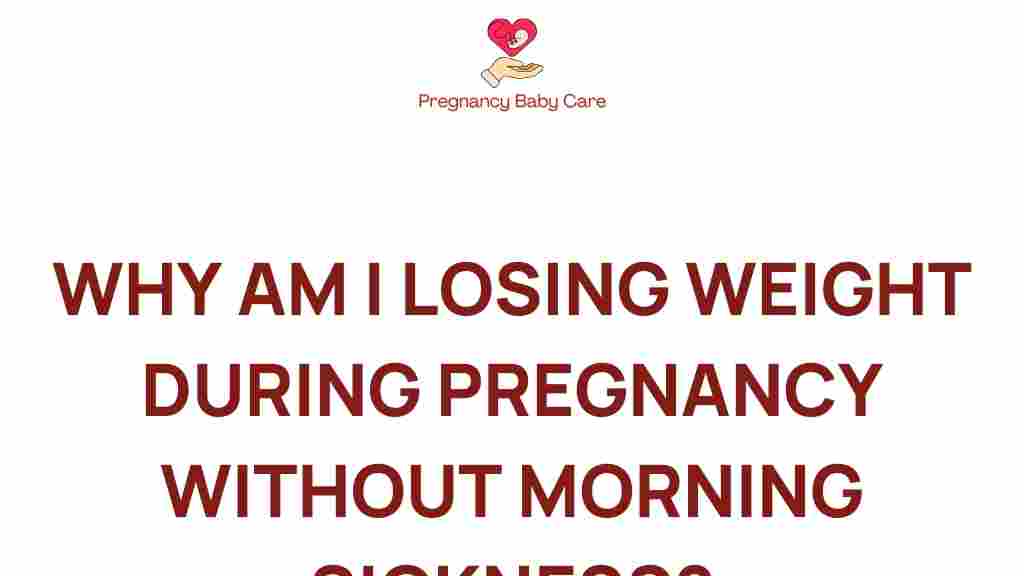Unraveling the Mystery: Weight Loss During Pregnancy Explained
Pregnancy is a remarkable journey filled with numerous changes in a woman’s body, emotions, and lifestyle. While many expectant mothers anticipate weight gain due to their growing baby, some experience unexpected weight loss during pregnancy. This article aims to explore the phenomenon of weight loss in pregnancy, the factors contributing to it, and its implications for maternal health.
Understanding Weight Loss in Pregnancy
Weight loss during pregnancy can be concerning for many women. However, it’s important to understand that some weight loss can be normal, particularly in the early stages. Factors such as morning sickness and dietary changes play significant roles in this. In this section, we will delve into the common causes of weight loss during pregnancy.
Common Causes of Weight Loss in Pregnancy
- Morning Sickness: One of the most prevalent pregnancy symptoms, morning sickness affects many women, leading to nausea and vomiting, especially during the first trimester. This can significantly reduce food intake, resulting in weight loss.
- Dietary Changes: Some women may find that their cravings change or that they develop aversions to certain foods, affecting their overall nutrition and calorie intake.
- Increased Metabolism: Pregnancy can increase metabolism, and while most women experience weight gain, some may lose weight if their energy expenditure exceeds their caloric intake.
- Stress and Anxiety: Emotional factors can also influence eating habits. Stress about pregnancy can lead to decreased appetite and unintended weight loss.
Health Implications of Weight Loss During Pregnancy
While a small amount of weight loss can be normal, significant loss can pose risks to both maternal health and fetal development. Here are some potential health implications:
- Nutritional Deficiencies: Weight loss can lead to nutritional deficiencies, which are crucial for fetal development. It’s essential to ensure that both mother and baby receive adequate nutrients.
- Low Birth Weight: Excessive weight loss during pregnancy can result in low birth weight, which is associated with various health issues for the baby.
- Dehydration: Severe morning sickness can lead to dehydration, which can have serious consequences for both mother and baby.
Nutrition and Prenatal Care
Proper nutrition is vital during pregnancy to support both maternal health and the baby’s development. If you are experiencing weight loss, consult with your healthcare provider to develop a suitable nutrition plan. Here are some tips to ensure you maintain a balanced diet:
- Focus on Nutrient-Dense Foods: Choose foods rich in vitamins and minerals, such as fruits, vegetables, whole grains, lean proteins, and healthy fats.
- Stay Hydrated: Drink plenty of fluids to help manage nausea and support overall health.
- Small, Frequent Meals: Eating small meals throughout the day can help manage morning sickness and improve appetite.
- Consult a Dietitian: A registered dietitian specializing in prenatal care can help create a personalized meal plan that meets your needs.
Monitoring Body Changes and Pregnancy Symptoms
As your pregnancy progresses, your body will undergo various changes. It’s essential to monitor these changes and maintain open communication with your healthcare provider. Keep track of:
- Weight Trends: Regularly monitor your weight to ensure that it’s within the recommended range for your stage of pregnancy.
- Symptoms: Note any pregnancy symptoms you experience, particularly those related to nausea and appetite changes.
- Emotional Well-Being: Pregnancy can be an emotional rollercoaster. Ensure you address any stress or anxiety that may affect your eating habits.
Troubleshooting Weight Loss Issues
If you are experiencing weight loss during pregnancy, here are some troubleshooting tips to help address the issue:
- Identify Triggers: Keep a food diary to identify foods that trigger nausea or aversions. This can help in planning meals that are more palatable.
- Ginger and Other Remedies: Natural remedies like ginger tea can help alleviate morning sickness. Discuss with your doctor before trying any supplements or remedies.
- Engage in Light Exercise: If you feel up to it, light exercise such as walking can help improve your mood and appetite.
- Seek Support: Talk to friends, family, or support groups about your experiences. They can provide encouragement and tips that worked for them.
Conclusion: Focus on Health and Well-Being
Weight loss during pregnancy can be alarming, but understanding its causes and implications is crucial for maternal health. Morning sickness, dietary changes, and emotional factors can all contribute to weight loss, particularly in the first trimester. It’s essential to prioritize nutrition and prenatal care to support both you and your baby. Regular check-ups with your healthcare provider will ensure that any issues are promptly addressed, allowing you to focus on a healthy pregnancy journey.
Remember, every pregnancy is unique, and what works for one woman may not work for another. Stay informed, seek professional guidance, and trust your body as it navigates this incredible transformation.
For more information on maternal health, visit this resource.
If you need personalized nutrition advice, consider contacting a registered dietitian or nutritionist specializing in prenatal care. Their expertise can be invaluable in maintaining a healthy pregnancy.
This article is in the category Pregnancy and created by PregnancyBabyCare Team
